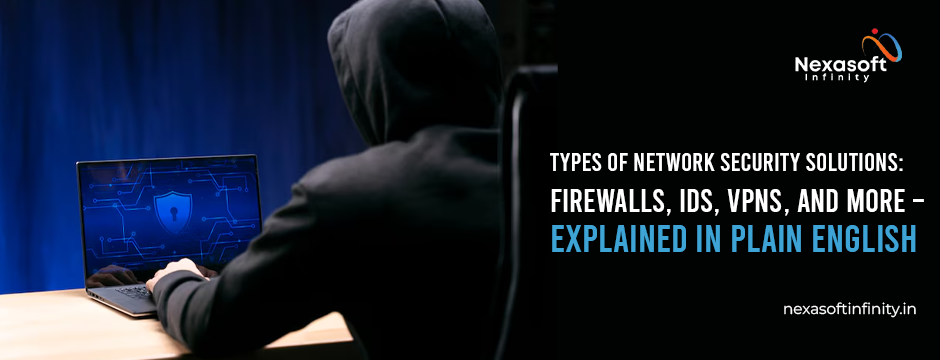
In an age where a single phishing link or an unnoticed network breach can throw an entire business off track, one thing is crystal clear: network security is no longer optional. It’s essential.
At Nexasoft Infinity, we’ve seen far too many businesses fall into the trap of thinking a basic antivirus or a generic firewall is enough. The reality? Cyber threats are smarter, faster, and more aggressive than ever—and if your network isn’t built like a fortress, you’re leaving yourself exposed.
So let’s cut through the tech jargon and take a real-world look at the most critical types of network security solutions your business should be thinking about—no fluff, just facts. And if you’re already overwhelmed with terms like “IDS”, “NAC”, and “EDR”, don’t worry. We’re breaking it all down simply, and showing you how these tools can protect your business from risk—and help it grow safely.
Why Network Security Isn’t Just an IT Job Anymore
Here’s something we tell all our clients upfront: cybersecurity is everyone’s business. Whether you’re in HR or Finance, the moment you connect to the company network, you become part of the security equation.
That’s because the threats today don’t just come from hackers in basements—they come from unsecured laptops, outdated apps, or even well-meaning employees clicking the wrong link.
The right network security solutions don’t just guard your systems—they give your team peace of mind, your customers confidence, and your business a stronger foundation.
1. Firewalls: The First Barrier Against Trouble
Let’s start with the basics: firewalls.
Think of them as the gatekeepers of your network. Just like a receptionist who decides who can enter your office, firewalls decide what digital traffic is allowed into (or out of) your systems.
There are different types:
- Hardware firewalls – these protect your entire network.
- Software firewalls – they’re installed on individual devices.
- Next-generation firewalls (NGFWs) – they do a lot more than just filtering; they inspect traffic, detect threats, and offer real-time protections.
Why it matters:
Without a firewall, your network is like a house with no doors—open to everyone, including cybercriminals. A smart firewall setup is the first step to securing your data, especially in today’s remote-work world.
2. Intrusion Detection and Prevention Systems (IDS/IPS)
Okay, so your firewall let someone in… now what?
That’s where Intrusion Detection Systems (IDS) and Intrusion Prevention Systems (IPS) step in. If the firewall is the gatekeeper, IDS/IPS is like a security camera and guard dog rolled into one.
- IDS monitors activity and raises an alert if something looks suspicious.
- IPS takes it a step further and actively blocks malicious behaviour.
Why you need it:
Even with firewalls in place, new threats can slip through. IDS/IPS adds another layer of defense by detecting unusual activity before it escalates into a full-blown attack.
For businesses that handle sensitive data or operate across multiple sites, these tools are non-negotiable.
3. VPNs: Safe Remote Access for Teams on the Move
The remote work revolution isn’t slowing down anytime soon. And while it’s opened up incredible flexibility, it’s also opened up new risks—especially when employees use public Wi-Fi or personal devices.
A Virtual Private Network (VPN) solves this by creating a secure, encrypted tunnel between the user and your business network.
Why this matters:
A VPN ensures no one can spy on what your employees are doing—even if they’re working from a café, hotel room, or airport lounge. It’s a must-have for any business embracing hybrid or fully remote models.
And when combined with strong network access control solutions, a VPN becomes a powerful tool for managing secure access.
4. Network Access Control (NAC): Who Gets In? And Who Doesn’t?
Not every device—or person—should have access to your network. That’s where network access control NAC comes in.
NAC checks every device trying to connect to your network: is it updated? Is it secure? Is the user authorised? If not, they’re stopped right there.
The real value:
- You control exactly who or what gets into your system.
- Devices that don’t meet your security standards get blocked or quarantined.
- You reduce your risk drastically, especially in BYOD (Bring Your Own Device) environments.
Network access control NAC gives you precision control over your network’s gates—and trust us, that’s a game changer in today’s digital climate.

5. Endpoint Detection and Response (EDR): Don’t Let Devices Be Your Downfall
Every laptop, mobile phone, or tablet is a potential vulnerability. And with more teams using personal devices, keeping track of them all is a serious challenge.
EDR helps you monitor and secure every endpoint. It looks out for signs of infection, suspicious behaviour, or anything out of the ordinary—and responds fast.
Why this tool works:
With EDR, you’re not just protecting your central network—you’re guarding every connected device in real time. And when tied into your larger network security solutions strategy, EDR helps lock down the full perimeter of your business.
6. Cloud Security: Because The Cloud Isn’t Automatically Safe
There’s a common myth that cloud providers automatically handle your security. The truth? Cloud security is a shared responsibility.
Whether you’re using AWS, Azure, or Google Cloud, you need to secure:
- Data transfers
- Access management
- File storage
- Cloud-based applications
That’s where network and cloud security tools come into play. From Cloud Access Security Brokers (CASBs) to multi-factor authentication systems, these tools help businesses take control over how cloud services are accessed and used.
Bottom line:
The cloud offers scalability and efficiency, but only if it’s protected. A breach in the cloud can be just as damaging—if not worse—than an on-premise attack.
7. Unified Threat Management (UTM): A One-Stop Security Hub
If you’re a small business or startup, managing multiple separate security tools can feel overwhelming (and expensive). That’s where UTM comes in.
A Unified Threat Management system combines essentials like:
- Firewall
- Antivirus
- Anti-spam
- Intrusion detection
- Web filtering
All in one dashboard.
Why some businesses love UTM:
- It simplifies your security setup.
- It’s cost-effective.
- You get broad coverage without hiring a full security team.
Of course, UTM isn’t a silver bullet. As your business grows, you’ll likely need more advanced, dedicated solutions. But for many, it’s the perfect starting point.
Picking the Right Tools: It’s Not One-Size-Fits-All
Here’s the truth: there’s no single setup that works for every company.
A local café with a point-of-sale system has different needs than a fintech startup managing investor data. That’s why the best security strategies begin with a risk assessment. Understand what’s most important in your business—and what’s most vulnerable. From there, it’s about building a layered defense strategy that evolves with your operations.
At Nexasoft Infinity, we don’t sell you on buzzwords. We help you make practical decisions, based on real needs.
What Nexasoft Infinity Brings to the Table
Our clients don’t come to us for cookie-cutter solutions. They come because they want clarity, confidence, and a team that truly understands what it takes to protect a growing business.
We offer:
- Tailored security plans – no copy-paste setups.
- Top-tier tools – from network access control solutions to advanced network and cloud security frameworks.
- Real support – from real people, not bots.
Whether you’re scaling your team, expanding into new markets, or simply want to sleep better at night knowing your data is protected—we’re here to help.
Final Thoughts
Cybersecurity doesn’t need to be complicated. It just needs to be done right.
Understanding the types of network security solutions—from firewalls and IDS to VPNs and network access control NAC—is the first step toward a stronger, safer business.
If you’re ready to get proactive about your security strategy, let’s talk. At Nexasoft Infinity, we make cybersecurity simple, strategic, and built for growth.

